

MyEDC account
Manage your finance and insurance services. Get access to export tools and expert insights.
Solutions
By product
By product
By product
By product
Insurance
Get short-term coverage for occasional exports
Maintain ongoing coverage for active exporters

See how portfolio credit insurance helped this Canadian innovator expand.
Guarantees
Increase borrowing power for exports
Free up cash tied to contracts
Protect profits from exchange risk
Unlock more working capital

Find out how access to working capital fueled their expansion.
Loans
Secure a loan for global expansion
Get financing for international customers
Access funding for capital-intensive projects

Find out how direct lending helped this snack brand go global.

Learn how a Canadian tech firm turns sustainability into global opportunity.
Investments
Get equity capital for strategic growth
By industry
Featured

See how Canadian cleantech firms are advancing global sustainability goals.

Build relationships with global buyers to help grow your international business.
Resources
Popular topics
Explore strategies to enter new markets
Understand trade tariffs and how to manage their impact
Learn ways to protect your business from uncertainty
Build stronger supply chains for reliable operation
Access tools and insights for agri-food exporters
Find market intelligence for mining and metals exporters
Get insights to drive sustainable innovation
Explore resources for infrastructure growth
Export stage
Discover practical tools for first-time exporters
Unlock strategies to manage risk and boost growth
Leverage insights and connections to scale worldwide

Learn how pricing strategies help you enter new markets, manage risk and attract customers.

Get expert insights and the latest economic trends to help guide your export strategy.
Trade intelligence
Track trade trends in Indo-Pacific
Uncover European market opportunities
Access insights on U.S. trade
Browse countries and markets
Get expert analysis on markets and trends
Discover stories shaping global trade
See what’s ahead for the world economy
Monitor shifting global market risks
Read exporters’ perspectives on global trade
Knowledge centre
Get answers to your export questions
Research foreign companies before doing business
Find trusted freight forwarders
Gain export skills with online courses
Discover resources for smarter exporting
Get insights and practical advice from leading experts
Listen to global trade stories
Learn how exporters are thriving worldwide
Explore export challenges and EDC solutions
About
Discover our story
See how we help exporters
Explore the companies we serve
Learn about our commitment to ESG
Understand our governance framework
See the results of our commitments
MyEDC account
Manage your finance and insurance services. Get access to export tools and expert insights.

Since the beginning of the pandemic, Export Development Canada (EDC) has regularly surveyed our research panel to collect timely insights into how the COVID-19 crisis is affecting Canadian businesses. Here’s what we learned in the fourth release of our survey.
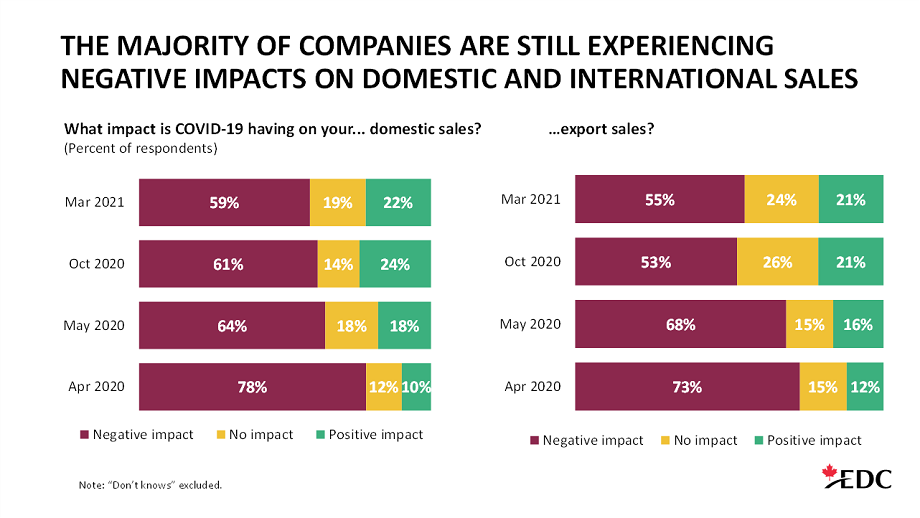
The majority of companies surveyed continue to report negative impacts of the pandemic on both their domestic (59%) and export (55%) sales. This represents progress since early in the pandemic, but we’re clearly not out of the woods yet, as roughly 70% of respondents expect these sales impacts to persist into 2022.
Since the first lockdowns more than a year ago that forced many companies to close and consumers to stay home, we’ve seen a significant number of companies (56%) improve and adapt their online sales capabilities. In previous surveys, we noted that companies that had better online capabilities were better able to avoid large sales declines. That said, this transition hasn’t necessarily been easy for all companies. Key challenges cited in our survey include:

We were relieved to see that overall business concerns have fallen relative to our past surveys. Nonetheless, the leading worries remain reduced customer demand (12%) and employee safety (8%).
For companies trying to expand their international business, cross-border travel restrictions remain the top challenge, cited by 40% of respondents and unchanged from our last survey. This likely reflects not only the explicit government restrictions on all non-essential travel, but also the need for quarantine periods for those employees who’ve managed to successfully cross the border for work purposes.
Concerns about supply chain disruptions increased, as did connecting with customers. During our survey period, there was the high-profile, six-day blockage of the Suez Canal, and reports of growing shortages of semiconductor chips, among other issues, with rising costs to transport cargo.
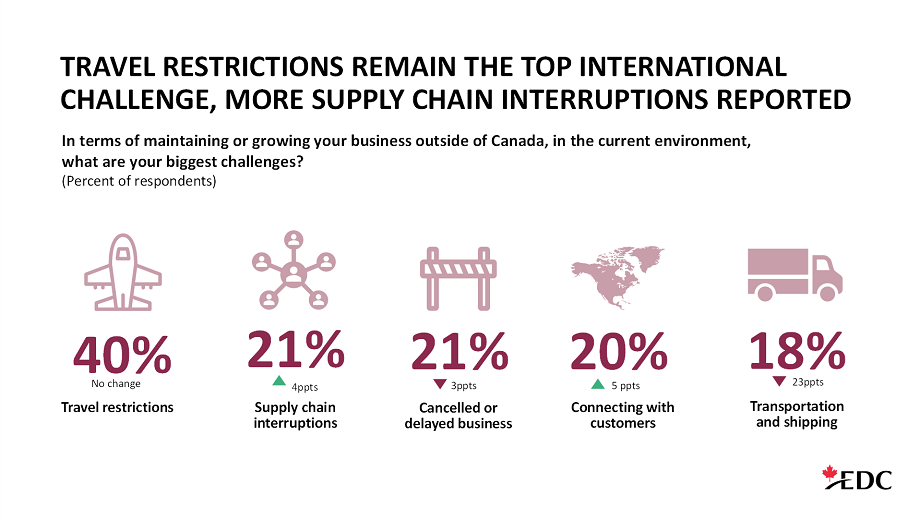
We found that nearly one-third of respondents are considering relocating business activities, with 8% and 6% having already offshored and reshored some production activities, respectively.
As companies remake their supply chains, our new survey question found that 18% of companies have added new suppliers, in an effort to diversify their supply chains, while around 10% made changes within existing domestic and international suppliers.
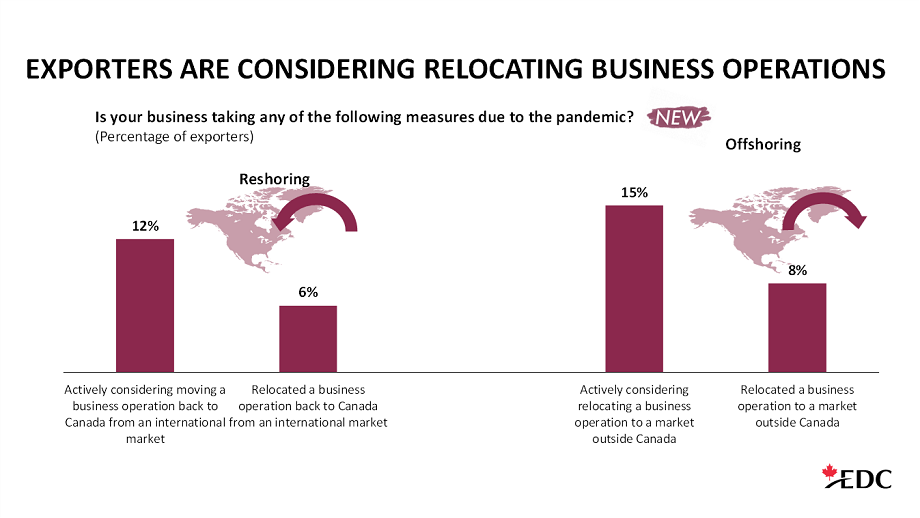
Despite the persistent negative sales impacts and disruptions, it wasn’t all bad news. We found that almost half of businesses (48%) plan to expand in the next year. More companies are finding new domestic opportunities (25%) and international opportunities (19%) from the economic situation around COVID-19. And with continued adaption to the new “business as unusual,” an increasing share—now 26%, up from 16% last April—are pivoting to support the pandemic.
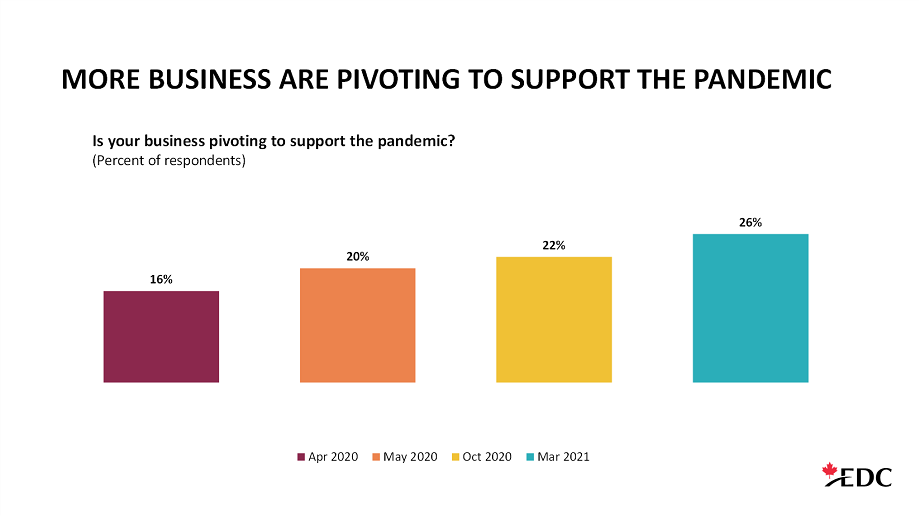
Unprecedented monetary and fiscal support from the Canadian government appears to have been effective at helping companies with their financial challenges. We found that 50% of the companies surveyed can operate for more than a year before needing additional financing—up significantly from 16% last year.
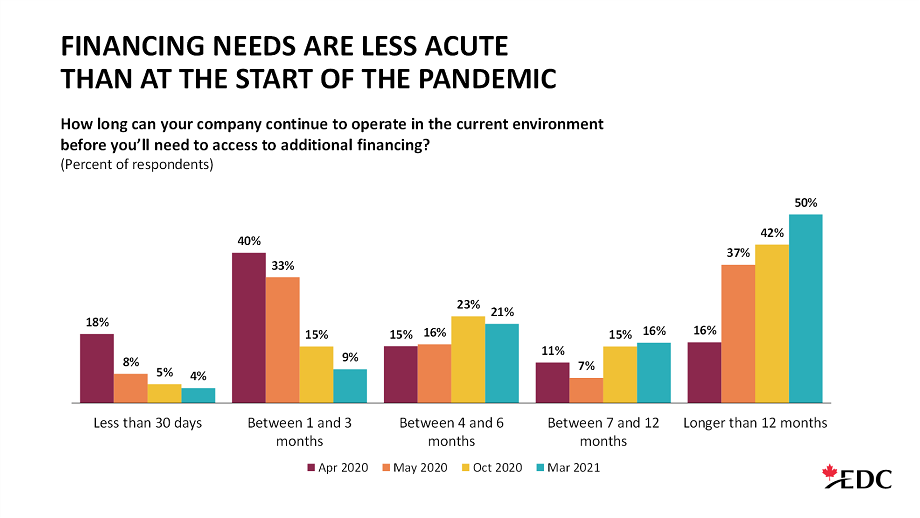
While the pandemic, and therefore, the global economic outlook, continue to evolve, opportunities and challenges for Canadian businesses are shifting as well. The negative impact on sales due to the pandemic are expected to last until 2022, but we’re also seeing more companies expanding their operations, while many are pivoting and finding new domestic and international opportunities.
COVID-19 has greatly accelerated the shift to online activities and we found that Canadian companies have improved their online sales capabilities, although these adjustments have been challenging. The high-level challenges for Canadian businesses have shifted from acquiring financing early in the crisis, to now managing supply chain disruptions and diversifying suppliers. As Canadian businesses continue to adapt to the pandemic and associated uncertainties, one thing is clear: “While we can’t direct the wind, we can adjust our sails.”

Stephen Tapp
Deputy Chief Economist
Export Development Canada

Jennifer Topping
Senior Customer Experience & Research Manager
Export Development Canada

The EDC Research Panel’s January survey highlights the challenges imposed by the global pandemic.
This snack manufacturer was hit hard by COVID-19, but rallied with the help of RBC and EDC.

Keep track of the international markets that matter to your business. Get the latest financial and macroeconomic information for both developed and emerging markets.

Insights from EDC’s Cleantech Export Summit on where global demand and investment are heading.

Discover Canadian tariffs on U.S. goods, CUSMA review and EDC support for managing trade risks.

Discover the Top 10 global risks for Canadian exporters in 2026—from CUSMA talks to trade wars and recession threats. Learn how to prepare with EDC insights.

EDC’s Economics team identifies the challenges and opportunities facing Canadian companies, including the impact of COVID-19, global protectionism, inflation, climate change and social unrest.